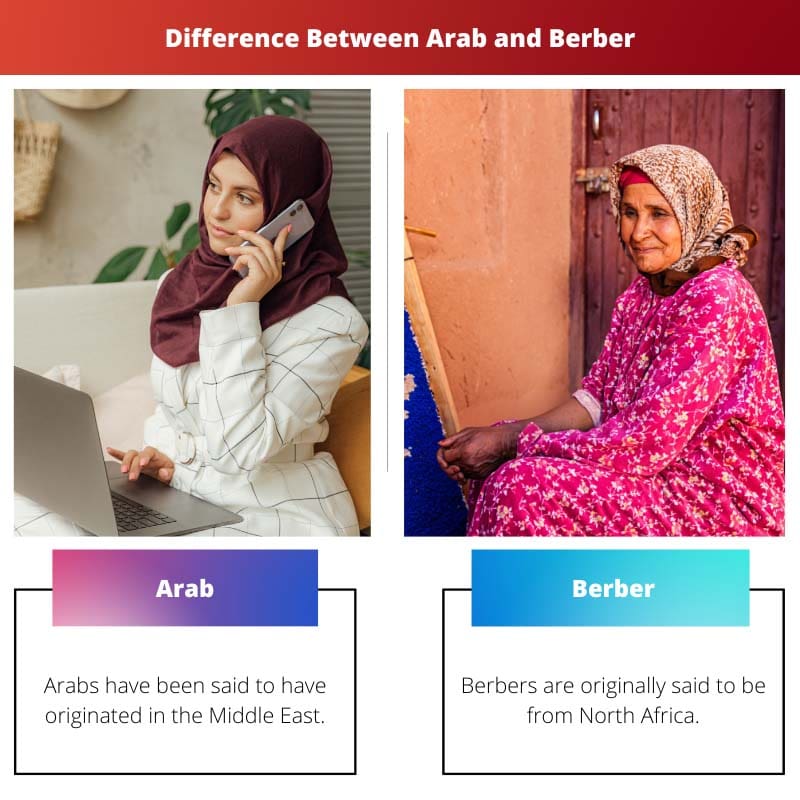There is a big difference between Arab and Berber. While they share some similarities, they are also very unique.
Both are Semitic, but Arabs and Berbers differ from each other in a number of ways that makes them two different cultures. It is essential to know the difference between these two races to be able to tell them apart.
Key Takeaways
- Arabs originate from the Arabian Peninsula, while Berbers are indigenous to North Africa.
- Arabic is the primary language of Arabs, while Berbers speak various Amazigh languages.
- Arabs are predominantly Muslim, while Berbers practice various religions, including Islam, Christianity, and traditional beliefs.
Arab vs Berber
Arab is a racial group native to the Arabian Peninsula in the Middle East and North Africa who speak the Arabic language as their mother tongue. Most of them are Muslims in religion. Berbers are the indigenous people primarily residing in the Maghreb region of North Africa.

The definition of “Arab” refers to people from Arab countries. Arab countries are found in the Middle East in Northern Africa and the Arabian Peninsula.
Over 400 million people live in the Arab world. Arabic is a language spoken by many in the Arab world.
The Arabic alphabet has 28 Arabic letters. Arabic is the most widely spoken Semitic language.
The term Berber comes from Greek, where it meant barbarian. The Greeks used this term to describe the original inhabitants of North Africa, who speak a form of Semitic.
The term Berber has now, however, come to describe any form of indigenous life in North Africa and is still used by North African Arabs to describe the people of the region.
Comparison Table
| Parameters of Comparison | Arab | Berber |
|---|---|---|
| Origin | Arabs have been said to have originated in the Middle East. | Berbers are originally said to be from North Africa. |
| Inhabitants of | They live in the middle east although they are found all around the world. | They live in North Africa mostly but they are geographically scattered. |
| Language | They speak Arabic. | Berbers are people who speak Amazigh |
| Religion | They are mostly Muslims however there are exceptions to this. | They are also mostly Muslims but their traditions are a bit different. |
| Looks | Arabs tend to have typical dark skin and dark hair. | Berbers are known to have European features like red/blonde hair or light-colored eyes. |
What is Arab?
Arabs are people who live in the Arab world. In short, it’s a geographical, cultural, and ethnic region located in the eastern Mediterranean and western Asia, which consists of 16 countries.
The people in these countries are called Arabs, but not all Arabs are Muslims. Some ancient Arab tribes converted to Christianity and Judaism, but nowadays, most Arabs are Muslims.
In the past, Arabs were known as great traders, but today they’re more known for their oil. The Arabic language is spoken here.
This language is one of the six official languages of the United Nations. The Arab League is currently made up of 22 Arab states.
When Arabs moved into North Africa, they invaded and dominated the Berbers. This is the reason why Arabic became integrated with the Berbers.
Arabs are also known to be tall people with characteristic features like curly hair, dark skin, and almost Asian features; however, that is not a stereotype.
They differ from the Berbers because although they are both predominantly Muslims, they differ in their histories and place of origin. This makes their traditions and cultures different from each other in many ways, including their religious beliefs.

What is Berber?
If you ask any North African what they’re called, they’ll probably tell you they’re Berber. This is their racial identity.
But there is a more specific meaning to the word: In North Africa, the term Berber is used to refer to tribes who inhabited the region before the 7th-century Arab invasion of the Maghreb.
A Berber tribe is made up of people who speak a particular Basque language and have lived in the region for generations. These are the tribes considered Berber, yet there have been many groups to resist the label because of its Arab origin.
It’s likely a corruption of the word Barbar, a term that was used by the invading Arabs to refer to the region’s natives.
Berbers are today a widely spread population of people that resides in different countries across the world. The main countries where Berbers live are Algeria, Morocco, Libya, Tunisia, and Mauretania.
Berbers are also located in the Atlas Mountains, the Rif Mountains, the Middle Atlas, and the Kabylie Mountains.
In the United Kingdom, Berbers are located in Birmingham, Coventry, Manchester, and London. They speak one of the Amazigh languages and have a wide range of traditions and cultural identities, though they are divided into tribes and ethnic groups.

Main Differences Between Arab and Berber
- If you look at the history of the Arabs and the Berbers, you will notice that they have different origins.
- Ethnic Arabs are darker-skinned and have curlier hair, while Berbers are more fair-skinned and have straighter hair.
- Arab people are those who live in the Arabian Peninsula. Berbers, on the other hand, are people who live in the Maghreb region of North Africa. They are of mixed Arab and indigenous descent.
- Arabic is the common language of the Arabs, while Berbers speak Arabic s well as the regional language called Amazigh.
- Arabs are mostly urbanized today, but the Berbers still live in rural areas and, in some places, are also considered tribes.

